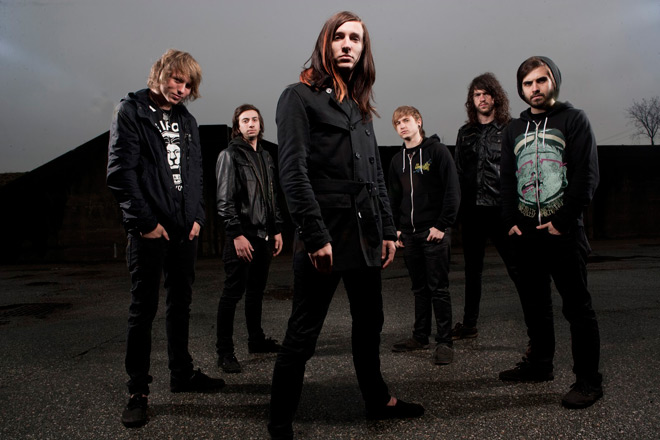
At that time, The Word Alive—Vocalist Tyler “Telle” Smith, Guitarists Zack Hansen and Tony Pizzuti, Bassist Nick Urlacher, Drummer Justin Salinas, and Keyboardist Dusty Riach—were riding high off the successful release of their Fearless Records’ debut EP, 2009’s Empire. Reaching No. 15 on Billboard’s Top Heatseekers chart, an unheard of success for a band without a full-length, The Word Alive were poised for great things. Formed in 2008, in Phoenix, they had initially featured Craig Mabbitt as their lead vocalist, but conflicting schedules with Mabbitt’s second gig, Escape the Fate, would lead to his departure. Into the vocal slot stepped former In Fear and Faith vocalist and Greeley Estates’ bassist, Tyler “Telle” Smith, marking one of the first major line-up shake-ups.
But from then to now, the band has persevered. To date, they have gone on to issue five additional and exceptional discs over the past decade, including 2012’s Life Cycles, 2016’s Dark Matter, and 2020’s Monomania. Consistently maturing their sound with each new release has earned them well in excess of 120 million streams, as well as the chance to share stages with everyone from Parkway Drive to Beartooth. One might say that today’s The Word Alive—Smith, Pizzuti and Hansen joined by Drummer Matt Horn—is the streamlined achievement of what Deceiver initially set out to do.
Back in 2010, however, The Word Alive was a baby band. Barely two years into their career, they were sitting down to record a studio debut that would ultimately land them at No. 97 on the Billboard 200 and No. 15 on the Independent Albums chart. Produced by Andrew Wade (A Day to Remember, Motionless in White), the 10-song LP took Empire to the next level, blending melody with vicious assaults, dueling Prog Metal spiced guitars, and the heart necessary to earn them a place of pride in a crowded scene.
They kicked it all off with the brutality and delicious synths of “The Hounds of Anubis,” which set the stage for what was to come with its flawless Metalcore format complemented by frenetic guitars from Hansen and Pizzuti. Not a sonic course in Egyptian mythology, instead the track is an homage to the fans who helped The Word Alive to build their musical kingdom. They followed this with the vicious blast beats of “Epiphany,” and the track that lends the album its title, “The Wretched,” an epic sing-along featuring David Stephens of We Came As Romans.
But what was 2010 without a good inter-band beef? Without rehashing any of the past drama, the candid emotions of “Consider It Mutual” provided a response to a one-time friend, pointing the finger back in his face while providing candid emotion and some bluesy guitars. None of us could know it at that time, but the song was a foreshadowing of the band’s future, one that would kiss goodbye to the blast beats in favor of a melodic overdose that allows Smith’s sincere lyrics (and superb vocals) to truly shine.
Speaking of friends, Levi Benton of Miss May I would lend his voice to the bleak stomp of “2012,” whose synth breakdowns paved the way for the sextet to provide more shades of their future on the atmospheric “Dream Catcher.” Quite possibly Smith’s most personal song up until this point, “Like Father Like Son” laid it all on the line as a thank you letter to the man who raised the vocalist, and offered up further Prog Metal influenced insanity from the killer axe-slingers.
This continued into the guitar blitzkrieg of “Battle Royale,” which signaled the beginning of the end. One away from their finale, they dipped into the bittersweet power ballad “You’re All I See,” then opted to end their debut with additional blast beats on “We Know Who You Are.” Yet another delicious juxtaposition of brutally heavy verses and soaring, catchy choruses, it marks just one of many tracks that suit the band’s then Metalcore designation—although they were always so much more.
With elements of Death and Progressive Metal, emotionality, and an ear for infectious melodies that would stick in fans’ psyches, The Word Alive crafted a debut that rose above so many of their recycled contemporaries. Though it beautifully represents the 2010 Metalcore scene as a collective entity, Deceiver is a debut that never flinched in its approach. Its six young creators dove into a bold myriad of lyrical topics, from friction with former bandmates to being away from the one you love, while refusing to be boxed into a formula. In what would become Smith’s signature lyrical style, little was held back and the songwriter made himself an open book. He and his bandmates were honest, passionate, and never so self-serious as to be undeservedly cocky like some of the others in the pages of Alternative Press.
These days, well, there’s always going to be those that feel compelled to mumble “The Word Alive haven’t done anything good since Deceiver,” but we respectfully disagree. In a big way. Still going strong and continuously producing inspired results, Smith, Hansen, Pizzuti, and Horn—who gave worldwide fans a livestream full Deceiver playthrough on Saturday, August 29th—have proven themselves sonic chameleons who are able to deliver in any genre. If that’s deceit, well, sign us up!

The Word Alive – Deceiver A Decade Later
Category(s)Album RetrospectivesCryptic RockCrypticRockNews
Tags10 Year Anniversary2010 album2010 debut2010 music2012Album Anniversaryamazing debutAndrew WadeArizona bandBattle RoyaleConsider It MutualDark MatterDavid Stephensdebut albumDeceiverDream CatcherDusty RiachemotionalityEmpireEpiphanyFearless RecordsJustin SalinasLevi BentonLife CyclesLike Father Like SonMatt HornmetalMetalcoreMiss May IMonomaniaNick Urlachersextetsincere lyricssincerityThe Hounds of AnubisThe Word AliveThe WretchedTony PizzutiTyler "Telle" SmithWe Came As RomansWe Know Who You AreYou're All I SeeZack Hansen
Related Articles
Comments are disabled.




